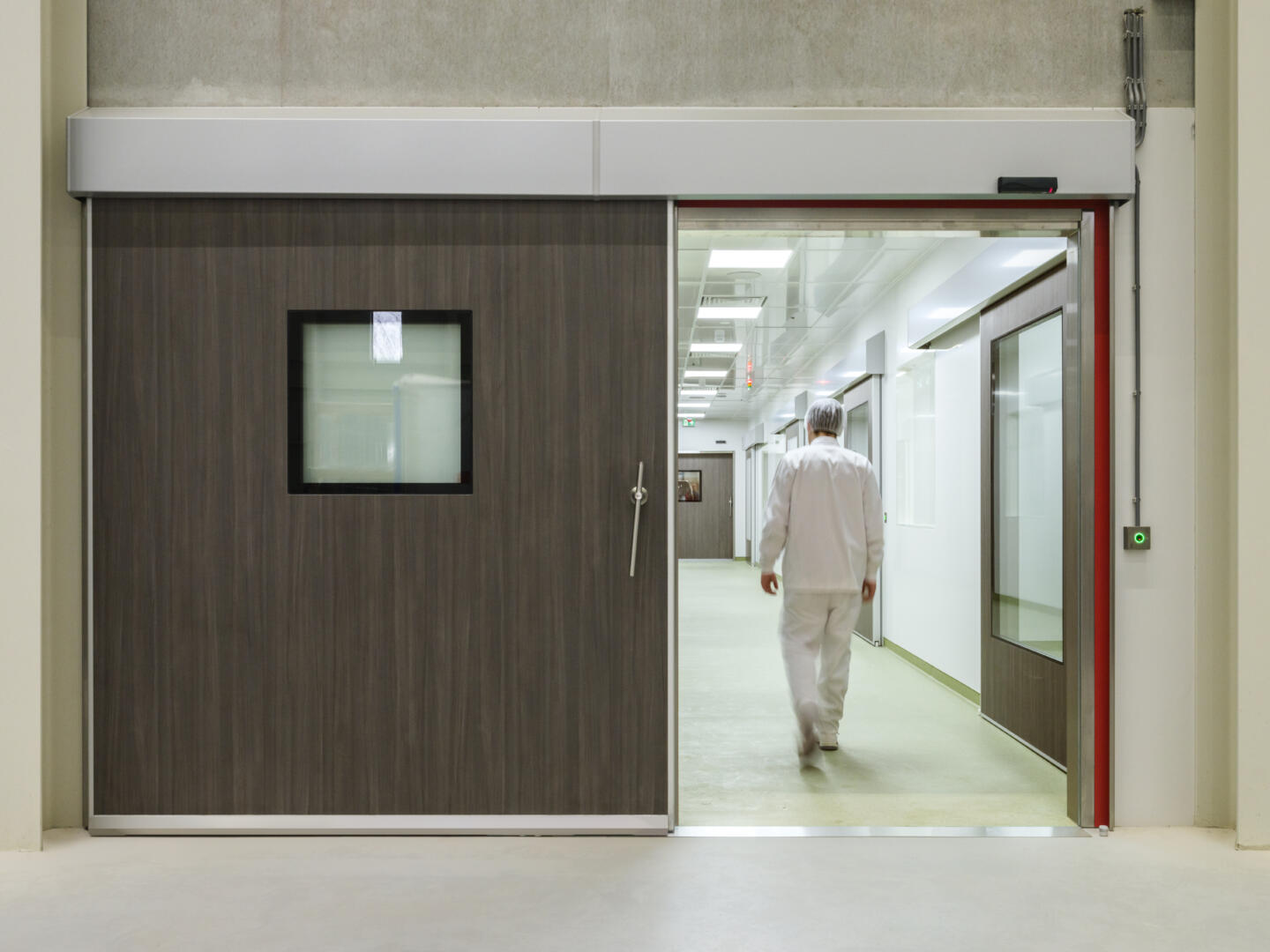
The history of Metaflex; from MF1 to MF7
2 May 2024

Are you searching for a discreet yet effective solution to maintain a sterile environment and prevent contamination in critical areas? Then our Hermetic Doors is the solution your needs. These doors offer a range of benefits that are essential in reducing the risk of infections in high-risk settings. By acting as a reliable barrier against airborne contaminants and controlling airflow, these doors play a vital role in creating a safer environment for patients and medical professionals.
Airtight doors play a crucial role in reducing infections by preventing the leakage of contaminated air and maintaining a controlled and sterile environment in medical facilities.
By effectively sealing off areas and minimizing air leakage, airtight doors help prevent the spread of infectious agents and reduce the risk of infections in healthcare settings. One of the main benefits of airtight doors is their ability to control airflow. By minimizing disruptions and maintaining a consistent air pressure, these doors help minimize the occurrence of postoperative wound infections (POWIs) in operating rooms.
POWIs are common complications after surgery and can lead to longer recovery periods and even death.
Airtight doors ensure that the air inside the operating room remains clean and uncontaminated, reducing the risk of surgical site infections.
Furthermore, airtight doors help create a barrier against airborne contaminants, ensuring that the desired pressure differences are maintained in the operating room. This not only provides a safer environment for patients but also protects the health and well-being of medical staff.
In addition, airtight doors contribute to energy efficiency by reducing the loss of conditioned air, resulting in cost savings for medical facilities.
Sliding doors with airtight features offer several advantages in maintaining controlled environments and minimizing air displacement. Hermetic sliding doors are specifically designed to prevent air leakage and provide effective control of air leakage in various settings. These doors offer airtight sealing, ensuring the protection of people and maintaining the desired pressure differences in operating rooms, hospitals, laboratories, cleanrooms, pharmaceutical facilities, and research facilities.
Hermetic sliding doors are made from durable materials and equipped with airtight gaskets that create a secure seal. They’re designed with smooth sliding mechanisms and are available in different sizes to suit specific requirements. These doors can also be integrated with access control systems to enhance security measures.
To ensure the proper functioning of hermetic sliding doors, regular maintenance and care are essential. This includes inspecting and cleaning the airtight gaskets, lubricating the sliding mechanisms, and promptly replacing any damaged components. Periodic pressure tests should also be conducted to ensure the doors’ hermetic properties.
While hermetic sliding doors may require a higher initial investment, they offer long-term cost reductions by minimizing the risk of infections and associated healthcare costs. Their customizable options and additional features may affect the overall cost, but their lifespan and durability make them a cost-effective choice for maintaining controlled environments and protecting people.
Intelligent airtight doors provide advanced features and enhanced safety measures for controlled environments. These doors, such as the Medicare Intelligence, are designed to ensure complete hermetic sealing and minimize air leakage when closed. With powerful control mechanisms, they allow for fast and efficient opening and closing.
Intelligent airtight doors are particularly beneficial in airlock systems and areas where air control is crucial, such as operating rooms and cleanrooms. They act as a barrier against airborne contaminants and help regulate airflow, reducing the risk of surgical site infections and maintaining the desired pressure differences in the room.
In addition to their functional benefits, intelligent airtight doors also offer intuitive LED warnings and clear instructions, promoting attention and sustainable behavioral change to improve overall safety. These doors are equipped with advanced technology that prevents incidents and ensures a secure environment for both patients and medical staff.
Whether in the form of sliding doors or hermetic swing doors, intelligent airtight doors provide reliable and efficient performance. They’re an essential component in maintaining sterility, preventing contamination, and creating a controlled environment in various industries, including healthcare, research facilities, and pharmaceutical facilities.
The characteristics of airtight doors make them an essential component in various industries where maintaining sterility and preventing contamination is crucial. Airtight doors are designed to prevent the uncontrolled flow of air, ensuring a secure and controlled environment. These doors have high airtightness classifications, providing a reliable seal and minimizing the risk of infection.
Airtight doors are available in both automatic and manual variants, offering flexibility in their use. They can be either sliding or hinged, depending on the specific requirements of the industry. In addition to their airtightness, these doors also provide sound reduction, creating a quieter and more comfortable environment.
Airtight doors are particularly beneficial in environments that require thermal insulation, such as cold and freezer rooms, as they prevent air leakage and contribute to energy-efficient temperature control. These doors are also easy to clean and maintain, making them suitable for industries with high hygiene requirements.
To further explore the applications and features of airtight doors in the medical field, let’s now focus on their medical application and unique features.
Our Hermetic Doors have several medical applications and features that make them ideal for hospitals and healthcare facilities. These doors are specifically designed to protect patients and staff with their complete hermetic and smoke-tight seal. They can also be equipped with radiation-proof, soundproof, and fire-resistant properties for added safety.
One of the key features of our hermetic doors is their unique closing system, which ensures airtight sealing even under extreme pressure and prevents smoke infiltration. These sliding doors minimize air displacement when opening and closing, maintaining overpressure up to 100 pascal without any leakage. They also prevent uncontrolled airflow along the doors, creating a secure and controlled environment in situations with conditioned or contaminated air. This will reduce the air handling costs
In terms of operation, our Hermetic Doors are available in both automatic door and manual versions. With a fully flat finish and a clear opening equal to the frame size, these doors provide convenience and easy access in hospital settings. They have a frame width ranging from 800 to 2,100 mm and a frame height ranging from 2,100 to 2,700 mm, ensuring compatibility with various doorframe sizes in hospitals.
Creating a secure and controlled environment, the airtight seal of Hermetic Doors prevents uncontrolled airflow along the doors. This feature is crucial in restricted-access areas such as pharmaceutical facilities, where maintaining air quality and preventing contamination is of utmost importance.
The airtight seal of our Hermetic Doors ensures that conditioned or contaminated air doesn’t escape or enter when the doors are closed. This is essential for maintaining the desired pressure differences and minimizing the risk of airborne contaminants in sensitive environments like pharmaceutical facilities.
In addition, the airtight seal of Hermetic Doors can be integrated with an access control system, providing an extra layer of security in restricted-access areas. This allows for controlled entry and prevents unauthorized access, ensuring the safety and integrity of the facility.
In considering the various options for hermetic sliding doors, it’s important to explore the additional features and customization choices that can optimize the functionality and security of these laboratory doors in pharmaceutical facilities. We offer a wide range of options for hermetic sliding doors that can meet the specific needs of different environments.
One important option is noise-reduction, which helps to improve acoustic insulation and create a quieter environment. Additionally, the hygienic finish for the door system ensures that the doors are smooth, non-porous, and fluid resistant, making them easy to clean and maintain in areas where infection control is paramount.
For facilities that require enhanced security, the door system can be integrated with access control systems, providing an added layer of protection against unauthorized access. Furthermore, the door blade offers 100% design freedom, allowing for customization and flexibility in terms of size and appearance.
In conclusion, our Hermetic Door is an excellent solution for maintaining sterility and preventing contamination in high-risk environments such as operating rooms.
With its airtight seal, smooth sliding mechanisms, and integration with access control systems, these doors offer enhanced security and infection control. Regular maintenance and care are crucial for their longevity and effectiveness.
Despite the initial investment, the long-term cost reductions and improved infection control make our hermetic doors a worthwhile investment for various medical and research facilities.

2 May 2024

17 April 2024

27 March 2024